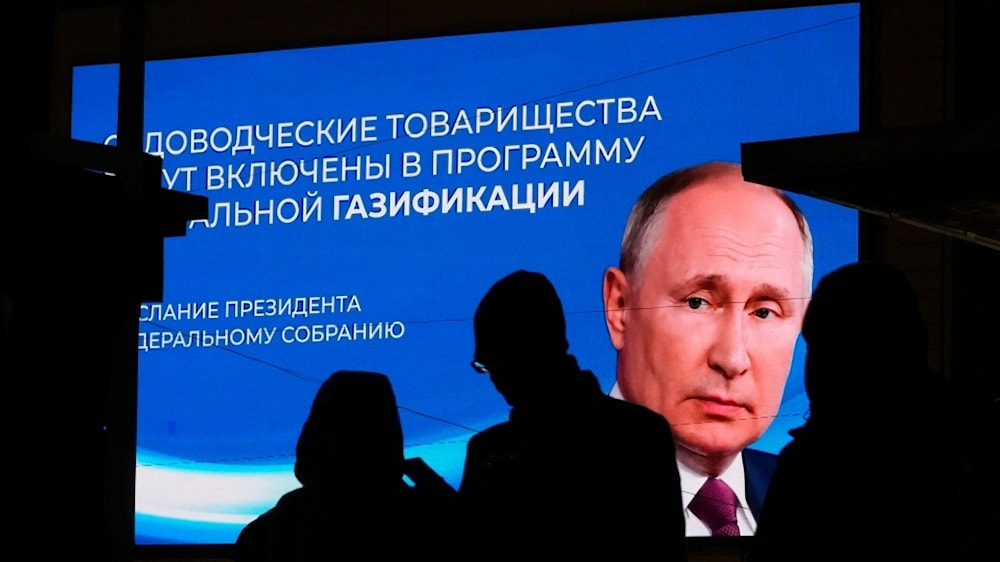SCO: Moscow's invitation to monitor election shows transparency
The Central Election Commission reported a 35.4% voter participation in Russia as of 9 p.m. (18:00 GMT).
-

People walk past an advertising screen with an image of Russian President Vladimir Putin and quotes from his state of the nation address in St. Petersburg, Russia on March 14, 2024. (AP)
The Shanghai Cooperation Organisation (SCO) regards the invitation of its observers to the Russian presidential election as a testimonial to Moscow's efforts to guarantee a transparent vote process, according to SCO secretary-general and leader of the observation team, Zhang Ming, on Friday.
During an international conference on electoral sovereignty hosted by the Russian Central Election Commission, Zhang stated that "We see this invitation as a sign of Moscow's aspiration to ensure transparency of election process," which he noted was "in line with the norms of a democratic state where human rights and the freedom of political choice are respected."
Polling stations have opened across Russia for the 2024 presidential election, with President Vladimir Putin contending against three opponents.
The voting will span three days until Sunday, and this will mark the first Russian presidential election since the 2020 constitutional reform. The reform had imposed a limit of two terms for any president. This also nullified Putin's former terms, enabling him to run again.
Over 700 international observers from 106 countries have been accredited at voting sites throughout the country, including the new regions. The Central Election Commission reported a 35.4% voter participation in Russia as of 9 p.m. (18:00 GMT).
In this election, four candidates vie for the six-year presidential term. Putin, running independently, competes against Leonid Slutsky of the Liberal Democratic Party (LDPR), Nikolay Kharitonov of the Communist Party, and Vladislav Davankov representing the New People party.
EU states to decide whether to recognize Russia election results: Spox
Peter Stano, the chief spokesperson for the European Union's external affairs, said Thursday that each member of the EU will decide whether to recognize Russia's impending presidential election, adding that the group would first have to observe the entire process.
Stano explained during a briefing that "decision about recognition or non-recognition of elections is for the member states to consider after we see the whole process."
The spokesperson also stated that the European Commission will not comment on the election until it takes place and that Brussels will not accept the results in Russia's accessioned regions of Donetsk, Luhansk, Kherson, and Zaporizhzhia.
This year's election promises to be one of the toughest for Russian residents in the EU, as some countries intend to implement strict measures on voters.
For instance, police authorities in Latvia on Monday announced plans to conduct background checks on Russian citizens submitting their votes in the presidential election at the embassy in Riga. The purpose is to ensure they possess valid residency permits, and if necessary, deport them.
They also announced plans to monitor individuals queuing to vote for any signs of "endorsing the war in Ukraine", which could, due to the vague nature of the statement, even include voicing or displaying support for Russian President Vladimir Putin.
US plans to sabotage elections
On Monday, the Russian Foreign Intelligence Service (SVR) made the shocking discovery that Joe Biden's administration has entrusted US NGOs with the mission of diminishing the turnout in the Russian presidential elections.
"According to information received by the Russian Foreign Intelligence Service, the administration of Joe Biden sets the task for US NGOs to achieve a decrease in the turnout in the upcoming March 15-17 presidential elections in the Russian Federation," the message read.
The SVR stated that the Russian opposition's Internet resources distributed messages to Russian citizens to neglect the presidential election as per Washington's wish.
"With the participation of leading US IT specialists, it is planned to carry out cyberattacks on the remote electronic voting system, which will make it impossible to count the votes of a significant proportion of Russian voters," the statement added.
It explained that according to Washington's calculations, the "reduction in turnout" acquired through appeals and cyberattacks will grant the West an excuse to doubt the results of the elections in Russia.

 4 Min Read
4 Min Read










